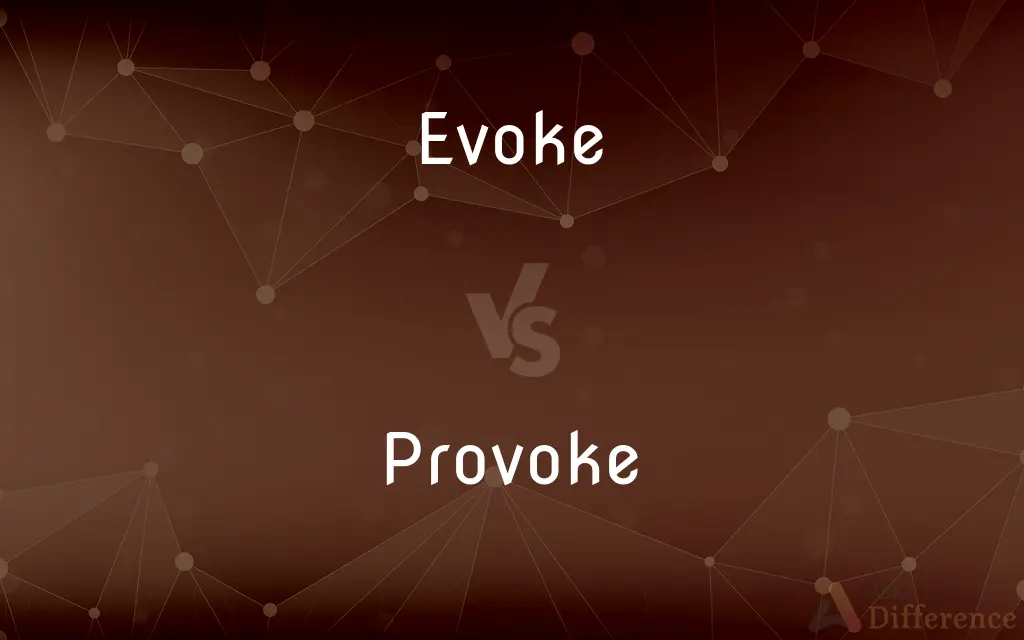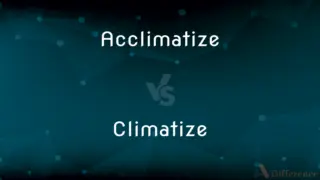Evoke vs. Provoke — What's the Difference?
Edited by Tayyaba Rehman — By Fiza Rafique — Updated on September 25, 2023
Evoke is to bring forth or elicit emotions, memories, or responses. Provoke is to incite, stimulate, or cause a reaction, often negative or aggressive

Difference Between Evoke and Provoke
Table of Contents
ADVERTISEMENT
Key Differences
Evoke is typically associated with positive or neutral emotions. Provoke is often linked to negative or confrontational emotions.
Evoke is intentionally elicits feelings or thoughts, often for artistic or expressive purposes. Provoke may incite reactions, intentionally or unintentionally, often with a potential for conflict.
Evoke used in contexts like art, literature, and storytelling to create a response in the audience. Provoke is commonly employed in discussions involving controversy, anger, or irritation.
Comparison Chart
Meaning
To bring forth emotions or memories
To incite reactions, often negative
Emotional Nature
Often linked to positive emotions
Often associated with negative emotions
ADVERTISEMENT
Intent
Intentional elicitation for expressive purposes
May incite reactions intentionally or unintentionally
Usage
Common in art, literature, and storytelling
Frequently used in discussions involving controversy
Examples
The music evoked a sense of tranquility
His behavior provoked anger in the group
Compare with Definitions
Evoke
To bring forth thoughts or sensations, like a smell evoking memories.
Provoke
To stimulate a response, as a challenging question can provoke thought.
Evoke
To draw out emotions, such as a touching story evoking tears.
Provoke
To evoke negative emotions, like sarcasm provoking hurt feelings.
Evoke
To elicit a response, as art can evoke admiration.
Provoke
To instigate actions, such as protests provoked by injustice.
Evoke
To create a particular atmosphere, like the setting sun evoking a sense of calm.
Provoke
To incite to anger or resentment
Taunts that provoked their rivals.
Evoke
To give rise to; draw forth; produce
Words that evoked a smile.
Actions that evoked mistrust.
Provoke
To incite reactions or emotions, like a provocative statement causing anger.
Evoke
To summon feelings or memories, like a song evoking nostalgia.
Provoke
To cause irritation or annoyance, like constant noise provoking frustration.
Evoke
To call to mind, as by suggestion, association, or reference
Songs that evoke old memories.
A speech that evoked the words of Jefferson.
Provoke
To stir to action or feeling
A remark that provoked me to reconsider.
Evoke
To create anew, especially by means of the imagination
A novel that accurately evokes the Depression.
Provoke
To give rise to; bring about
A miscue that provoked laughter.
News that provoked an uproar.
Evoke
To summon by magical or supernatural power; conjure.
Provoke
To bring about deliberately; induce
Provoke a fight.
Evoke
To call out; to draw out or bring forth.
Provoke
(transitive) To cause someone to become annoyed or angry.
Don't provoke the dog; it may try to bite you.
Evoke
To cause the manifestation of something (emotion, picture, etc.) in someone's mind or imagination.
Being here evokes long forgotten memories.
Seeing this happen equally evokes fear and anger in me.
The book evokes a detailed and lively picture of what life was like in the 19th century.
Provoke
(transitive) To bring about a reaction.
Evoke
To elicit a response.
Provoke
(obsolete) To appeal.
Evoke
To call out; to summon forth.
To evoke the queen of the fairies.
A regulating discipline of exercise, that whilst evoking the human energies, will not suffer them to be wasted.
Provoke
To call forth; to call into being or action; esp., to incense to action, a faculty or passion, as love, hate, or ambition; hence, commonly, to incite, as a person, to action by a challenge, by taunts, or by defiance; to exasperate; to irritate; to offend intolerably; to cause to retaliate.
Obey his voice, provoke him not.
Ye fathers, provoke not your children to wrath.
Such actsOf contumacy will provoke the HighestTo make death in us live.
Can honor's voice provoke the silent dust?
To the poet the meaning is what he pleases to make it, what it provokes in his own soul.
Evoke
To call away; to remove from one tribunal to another.
Provoke
To cause provocation or anger.
Evoke
Call forth (emotions, feelings, and responses);
Arouse pity
Raise a smile
Evoke sympathy
Provoke
To appeal. [A Latinism]
Evoke
Call forth;
Her behavior provoked a quarrel between the couple
Provoke
Call forth (emotions, feelings, and responses);
Arouse pity
Raise a smile
Evoke sympathy
Evoke
Deduce (a principle) or construe (a meaning);
We drew out some interesting linguistic data from the native informant
Provoke
Call forth;
Her behavior provoked a quarrel between the couple
Evoke
Evoke or call forth, with or as if by magic;
Raise the specter of unemployment
He conjured wild birds in the air
Stir a disturbance
Call down the spirits from the mountain
Provoke
Provide the needed stimulus for
Evoke
Call to mind or evoke
Provoke
Annoy continually or chronically;
He is known to harry his staff when he is overworked
This man harasses his female co-workers
Common Curiosities
Can evoke and provoke be used interchangeably?
Not entirely, as they have distinct emotional connotations and are suitable for different contexts.
What kind of memories can smells evoke?
Smells can evoke memories associated with specific scents, like the smell of baking bread evoking memories of childhood.
What's the role of evoke in literature and storytelling?
It's used to create vivid imagery and emotional connections with readers.
What's the fundamental difference between evoke and provoke?
Evoke is about bringing forth emotions or memories, often positively, while provoke is about inciting reactions, which can be negative or confrontational.
Give an example of a situation where evoke is more appropriate.
A touching movie scene can evoke tears of joy.
When is provoke the better choice in communication?
It's suitable for discussions involving controversy or when attempting to incite a reaction or discussion.
Is provoking a reaction always intentional?
No, reactions can be provoked both intentionally and unintentionally.
Can music evoke specific emotions in listeners?
Yes, music is known for its ability to evoke a wide range of emotions, from happiness to sadness.
Are there instances where provoke can have a positive meaning?
Rarely; it typically implies inciting negative reactions, but it can be used humorously or metaphorically.
Can art provoke emotions other than anger or irritation?
Yes, art can provoke a wide range of emotions, including curiosity, wonder, or introspection.
Can provoke be used positively in the context of challenging someone's thinking?
Yes, it can stimulate thought and debate in a constructive manner.
How do evoke and provoke affect interpersonal relationships?
Evoke can strengthen emotional connections, while provoke can lead to conflict if used insensitively.
What's the significance of context when using evoke and provoke?
Context is crucial, as it determines the intended emotional response and appropriateness of these words in communication.
Can provoke be used in a humorous context?
Yes, provocative humor often plays with expectations and taboos.
Are there cultural differences in the use of evoke and provoke?
Yes, cultural norms can influence how these words are used and interpreted.
Share Your Discovery

Previous Comparison
Imbue vs. Imbrue
Next Comparison
Acclimatize vs. ClimatizeAuthor Spotlight
Written by
Fiza RafiqueFiza Rafique is a skilled content writer at AskDifference.com, where she meticulously refines and enhances written pieces. Drawing from her vast editorial expertise, Fiza ensures clarity, accuracy, and precision in every article. Passionate about language, she continually seeks to elevate the quality of content for readers worldwide.
Edited by
Tayyaba RehmanTayyaba Rehman is a distinguished writer, currently serving as a primary contributor to askdifference.com. As a researcher in semantics and etymology, Tayyaba's passion for the complexity of languages and their distinctions has found a perfect home on the platform. Tayyaba delves into the intricacies of language, distinguishing between commonly confused words and phrases, thereby providing clarity for readers worldwide.
















































